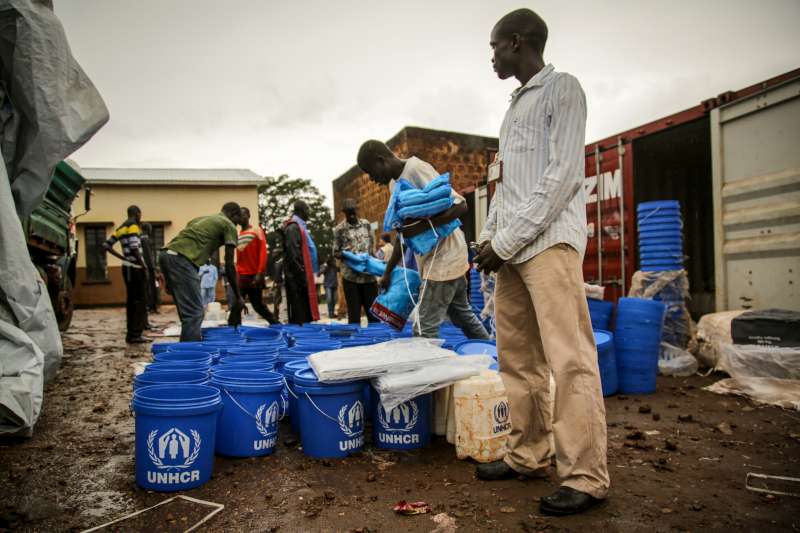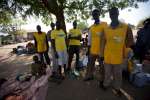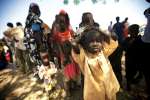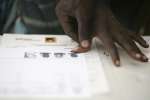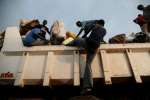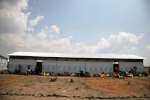- Text size
 |
|  |
|  |
| 
- عربي
UNHCR delivers relief to 25,000 displaced people in South Sudan
News Stories, 14 August 2015
MARIDI, SOUTH SUDAN, Aug 14 (UNHCR) – The UN refugee agency has completed distribution of emergency relief items to an estimated 25,000 internally displaced people (IDP), many of whom lost almost everything they had in recent violence, in South Sudan's Western Equatoria state.
The aid operation is targeting nearly 5,000 vulnerable families who were driven from their homes in Maridi town in early June when conflict between cattle keepers and farmers triggered ethnic violence, in which at least 14 people were killed and much property was destroyed.
According to a recent assessment, more than 35,000 South Sudanese people were forced to flee Maridi. In addition, 196 houses were burnt and the town market entirely looted.
One of the people who lost his home was Bernard, 50. He is blind and now lives now under a mango tree in the bush some 15 km east of Maridi.
He told UNHCR staff that he ran for his life with the help of his wife and son who guided him through the bush for several hours. The one thing that he managed to take with him upon fleeing was a pan. His life, he said, has become miserable.
"I used to have a roof over my head and eat three meals a day. Now I live in the open and I cannot afford more than one meal a day at best," he said.
Reportedly, some 25,000 people have found safety within Maridi county, while another 10,000 have sought refuge in neighbouring Ibba county.
The violence has also forced 150 Sudanese refugees to leave their homes in Maridi town and seek safety in Makpandu, a camp 100 km east of the conflict hot spot and already sheltering some 3,000 refugees from the Democratic Republic of the Congo and Central African Republic.
Frezer, also 50, lost his son Alex in the violence. He was shot dead upon returning from school. Alex, 26, was with his younger brother James, when he was killed.
"When the shooting started, we ran out of the classroom and rushed home," Jame said. "We bumped into two soldiers. They ordered us to sit down. As we sat on the ground, they put a bullet in my brother's head for no reason. Then, the same soldier turned his gun on me and pulled the trigger, but he had no more bullets."
UNHCR joined efforts with state and local authorities as well as partners Action Africa, Help International, and World Vision International to coordinate this response.
Five temporary distribution centres were established in the two counties to cover nine displacement sites: Mudubai, Muku, Nagbaka, Mboroko and Rastigi in Maridi county as well as Rubu, Manikara, Ibba town and Madebe in Ibba county.
The distribution reached out to approximately 4,100 families in Maridi county and another 900 in Ibba county. Amongst the items being handed out to the displaced were sleeping mats, blankets, plastic sheets, mosquito nets, soap bars, buckets, jerry cans and women's underwear.
"This is just a drop in the ocean compared to the needs of the affected population", said Ahmed Warsame, UNHCR Representative in South Sudan. "I wish we could support everybody and give everybody more, but our resources are limited."
It is crucial, Warsame added: "that other humanitarian agencies pay closer attention to the particular needs of these communities, based on their specific mandate."
During focus group discussions, displaced South Sudanese told UNHCR that they needed shelters, food and education for their children and farm tools. Most IDPs are currently living in the bush in makeshift shelters or under trees. Although local authorities have urged them to return to Maridi claiming improved security, many IDPs said that they do not feel it is safe to go back home. Those who lost their shelters and family members told UNHCR that they have no reasons to return home.
"We appreciate the efforts made by the authorities to re-establish security and public services in Maridi", said Warsame. "We hope peace will return soon to Western Equatoria and South Sudan as a whole."
A total of 1.6 million people have been internally displaced in South Sudan since December 2013. The country is also a host to more than 265,000 refugees from mainly Sudan's South Korfodan and Blue Nile. UNHCR is the lead humanitarian agency responding to IDPs needs for protection and works with South Sudanese authorities and partners to protect and assist asylum seekers and refugees.
By Rocco Nuri in Maridi

